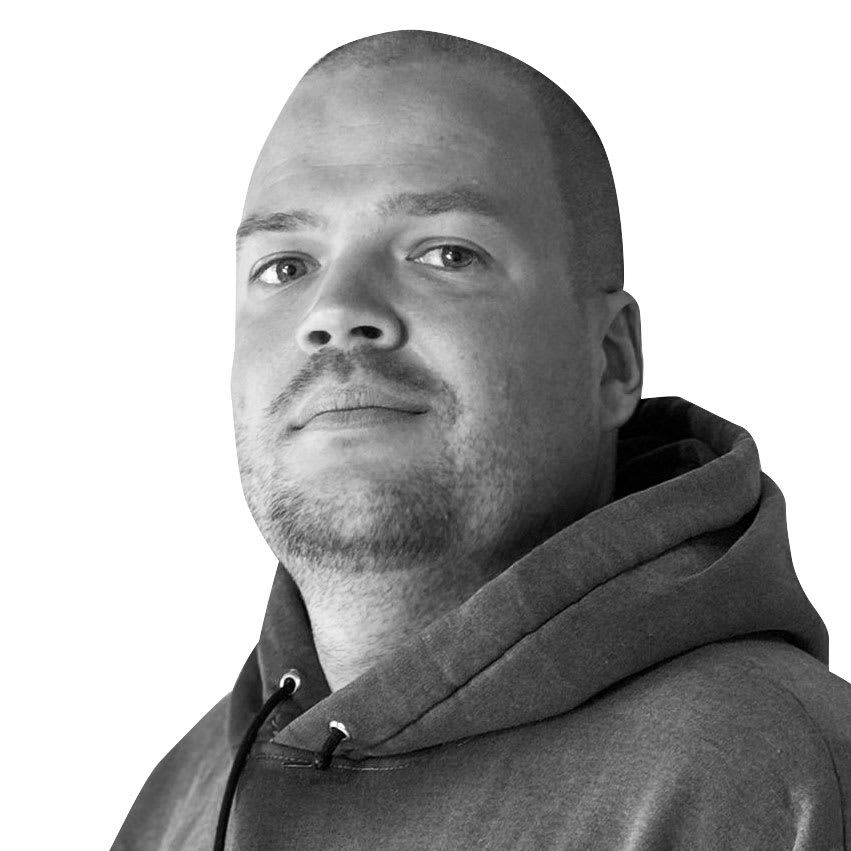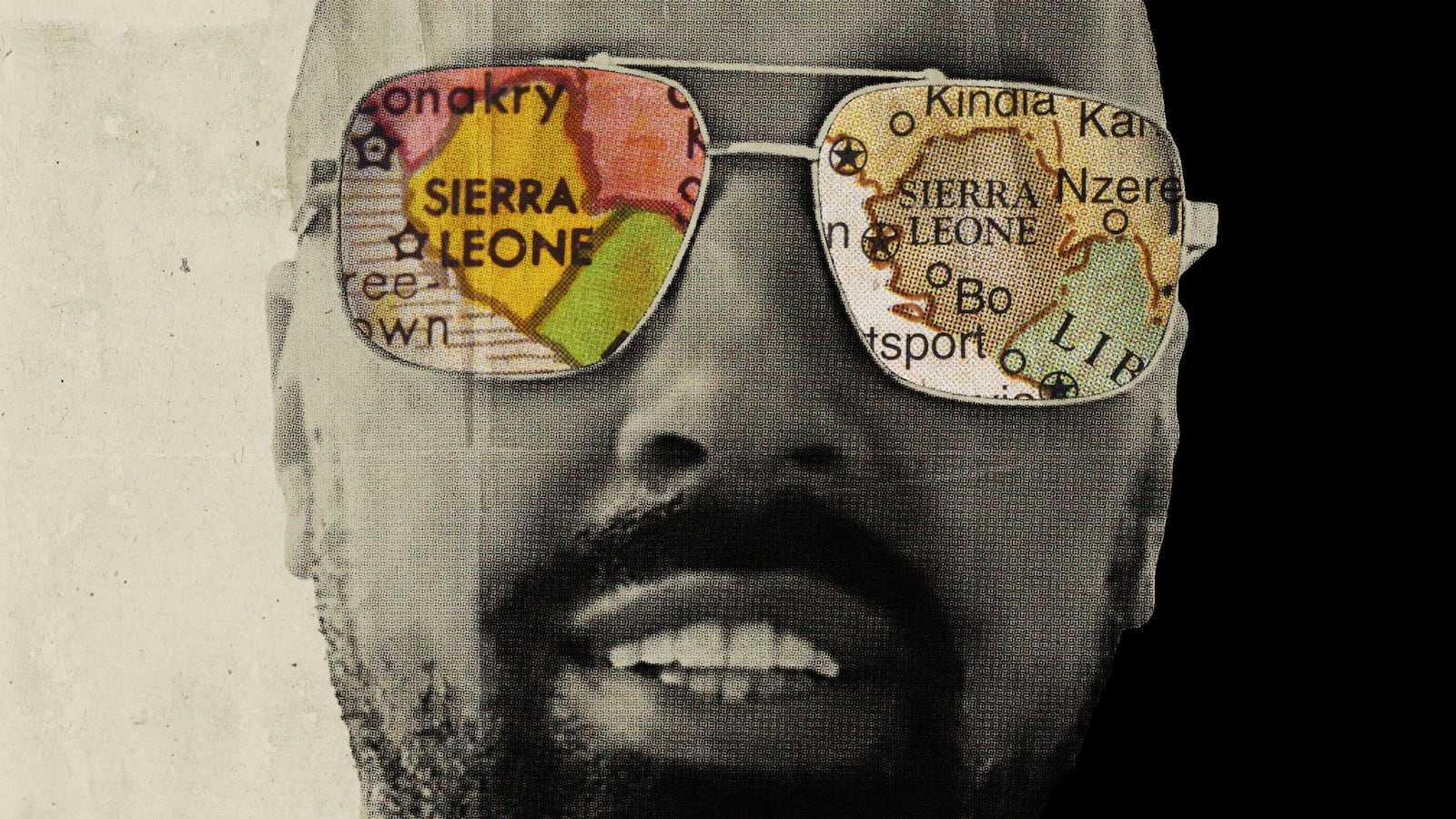“I’ve wasted 17 years of my life in prison since I was a kid. I used to sit there thinking: Is this all my life is, to be f---ing resigned to jail? What I do in Africa, this gives me a purpose in life, something to fight for. I know I can make a genuine change.”
Sam Walker is speaking to The Daily Beast by phone from a compound guarded by former child soldiers in Sierra Leone, the West African state where the Liverpool crook-turned-social media celebrity—and, apparently, international fugitive—posts videos of himself digging wells and other humanitarian work to his 150,000-plus Instagram followers, positioning himself as a scouse MrBeast… if the YouTube philanthropist had a Liverpudlian accent and a rap sheet with more than 100 felonies to his name.
“If you look at a slum, you think why is it they can install oil pipelines thousands of miles across the sea, but they can’t install fresh water here?” the ex-con continued.
“So I do what charities fail to do and install water. We’ve fixed kids’ cataracts; we’ve had bridges built; we’ve got schools which have been refurbished, because I’m a believer that education is the way out of poverty for these people, because an educated mind is something the system don’t want these people to have.”
It’s not uncommon for successful gangsters to give back to communities—Pablo Escobar had a whole neighborhood built for the homeless—but usually, it’s their own communities and not one 3,000 miles away. Why Walker does what he does, after all the things he’s done in a long criminal career, is obviously open for debate. One view might be that, like so many people, he’s just living for clicks and likes on TikTok and Insta, desperate to have his share of the global attention economy.
According to reporter Sorie Brahim Amara, however, Walker’s philanthropy is genuine.
“I covered a surgical operation for a girl living with cataracts and the construction of a water facility in King Tom Bay, Freetown,” Amara, who works with local news platform Africa Young Voices, told The Daily Beast.
“He had constructed a bridge, road, renovated a school, paid for surgical operations for children living with cataracts, he had also constructed a bore-hole water facility and four jack-pump water facilities in different communities. My community even benefited with a bore hole, and we have almost finished a jack pump and are commissioning two more. He had really done good for Sierra Leone.”
Walker’s criminal career began at an early age—partly out of circumstance and partly, he admits, because he “loved it.”
“I absolutely loved committing crime as a kid, I can’t sugarcoat it,” he explains. “I even look back to when I was 7 years old. I used to go to the local garage to rob sweets [candy] and give them to my classmates, then sit there and watch them eat them. That was the sort of thing I used to do every morning on the way to school.”
The 39-year-old hails from Liverpool in northwest England. As a port city, Liverpool has long been a hive of organized crime and drug traffic, spawning such masterminds as Curtis “Cocky” Warren, one of Britain’s wealthiest drug barons. Guns are relatively rare in Britain, and two years ago the city was shaken when a 9-year-old girl died in the crossfire of a failed gangland execution. In 2008, Walker was sentenced to four-and-a-half years for his role in a cocaine and heroin ring in nearby Cheshire, after an undercover operation netted millions of pounds’ worth of narcotics. Six years later, he was handed 14 months for handling counterfeit cash.
It was during one of his many spells in prison that Walker switched on to social media, posting, among other things, a mock variety show dubbed Prison’s Got Talent (a riff on the popular TV show Britain’s Got Talent).
“I was doing social media 15 years ago from prison, before social media had become a thing,” Walker says.
“I’ve had loads of accounts with hundreds of thousands of followers shut down, but I’ve got a loyal follower base. A lot of them have followed me in prison, and when I’ve gone out and done my stuff in Africa, gone back to prison and then come back to Africa again, a lot of them have followed me for years.”
In 2018, having been summoned to court for driving violations, Walker instead opted to charter a private plane to Belgium before hitching a boat ride from Europe to Africa then driving south over the Sahara desert until he reached Sierra Leone, his grandfather’s home country.
Describing the trip, he recalls how crossing the Sahara was “an absolute nightmare.”
“It’s not border security you have to watch out for when you go through Mali because there’s a lot of terrorist organizations and, especially as a white man, you’re at risk of being kidnapped,” he says. “So when I’d see a roadblock, I knew for a fact it wasn’t police and kept on driving.”
Sierra Leone, on the west coast of Africa, was founded in the late 18th century as a colony of formerly enslaved black Britons, who were later joined by Black Loyalists—African-Americans who sided with the British against their enslavers during the Revolutionary War—plus freed slaves from elsewhere in the British Empire. However, the largest ethnic group remain the native Temne, with whom the early settlers sometimes got into conflict.
In the 1990s, the now independent nation was plunged into a bloodbath when rebels from the Revolutionary United Front (RUF) seized the diamond mines to the east. This is when the movie Blood Diamond with Leonardo DiCaprio is set. Both the army and RUF enlisted child soldiers, force-feeding them “brown-brown” (a mix of cocaine and gunpowder) to psyche them for battle, turning them into frenzied, drug-addled killers who dismembered their victims and burnt down the capital, Freetown, in a terrifying rampage.
Walker claims he was moved by the poverty he witnessed on his first trip to Sierra Leone, in particular a sickly baby girl named Alia whose mother couldn’t afford to help her. Soon, however, his own funds started drying up.
“I flew back into the U.K. on a helicopter but [the police] found me a few months later,” Sam said.
“Even though people said it was only driving offenses, I knew they were going to keep me in for years, which is exactly what happened. They kept me [in prison] for two-and-a-half years, pulling all my charges on me.”
This February, Walker was arrested in Bournemouth, on the south coast of England. According to his version of events, the police found him with two cellphones and, suspecting him of drug dealing, searched his apartment and confiscated his passport. (A police spokesman refused to confirm or deny whether he was still the subject of any inquiry.) So, that same month, he once again boarded a private plane, repeating the journey he’d made in 2018. He now lives in a compound, protected by a group of demobilized child soldiers.
“In 2018 I’d met these lads who were former child soldiers and when I went back to the UK, over the past six years I’d always send money over to their families for birthdays or for Christmas,” he said.
“And when I came back to Sierra Leone, even though we hadn’t seen each other in six years, they see it as their duty to make sure that I’m fully safe while I’m over here. But I don’t pay them, I don’t hire them. And this is how I know I can trust them, because they don’t get paid a penny. They act purely out of loyalty, and that’s what money can’t buy.”
Walker says he spent his time in prison studying gold and diamonds and applied that knowledge to start a business in Sierra Leone, allowing him to fund his exploits. However, not everyone’s sold on his latest venture.
“Sam has posted multiple videos of him at mines and checking diamonds,” said journalist Sean Williams, host of the Underworld Podcast which recently did an episode on Walker.
“He also ran a recent online competition to win an uncut diamond, and the winning bid fell far below what you’d expect for a legitimate product. The numbers don’t add up.”
On the podcast, Williams and his co-host discussed whether Walker might be bribing officials to smuggle diamonds, or whether the diamonds themselves were fake. A day after the episode was released, Williams received death threats over Instagram aimed at him and his family, adding that “u and your colleagues ever come Sierra Leone and your life spans with (sic) drastically be shortened.”
Walker told The Daily Beast he gets the diamonds at below-market rates directly from the mines.
Meanwhile, Walker embarked on a crusade against what he described as corrupt, mismanaged charities.
“You’ve got CEOs getting paid hundreds of thousands of pounds,” he says. “They’ve got this money raised and they’re keeping the majority of it. They’ll book a five-star holiday with their family and call it a business trip… There’s so much corruption going on in these organizations that the only way the things are going to stop is if people start calling them out—where’s all this donated money going?”
Walker called out WaterAid and Street Child in particular, although The Daily Beast was unable to stand up his accusations.
Earlier in July, Sam led a small protest outside the Save the Children compound in the Freetown neighborhood of Aberdeen—which led to his arrest and reported confinement in Freetown’s notorious Pademba jail. In a statement to The Daily Beast, the charity confirmed that it had reported him to authorities and accused him of “harassing staff and publishing their images on his social media platforms.”
It added: “Mr. Walker’s actions disrupted our work while exploiting vulnerable children, creating concern for the safety and well-being of both our staff and the children we serve.”
Walker was released from jail following the protest, only to be immediately detained again and accused of espionage.
The spying charges could not be officially confirmed, but a friend of Walker’s, Connor Diack, launched a Change.org petition appealing for Walker’s release, insisting that his criminal career was over. “It is disheartening to see someone who has dedicated his life to charity and effected significant change in Sierra Leone targeted because of his past,” Diack wrote.
On Wednesday, Walker was freed again, and was straight on Instagram to describe his ordeal and accuse Save the Children of having orchestrated the spying charges.
“I tell you, corrupt charities, I will not be silenced,” he said. “The threat of prison does not scare me.”





